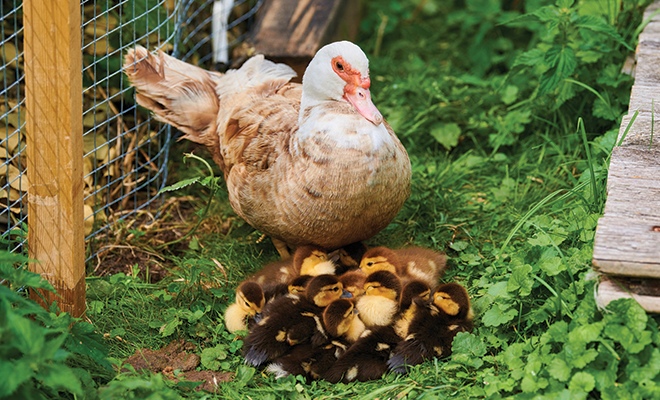
Urban Chickens and Hobby Ducks: Backyard Farmyards
Anatidaephobia is the fear that somewhere, somehow, a duck is watching you. Alektorophobia, or the fear of chickens, is derived from the Greek word “alektor,” which means rooster, and “phobos,” meaning fear. But people who raise ducks and chickens for food or as pets can assure you that there is nothing to fear with either critter.
Domestic ducks and chickens have been used as a food source since colonial times, and they are fast becoming a popular addition for urban farmers who are opting to cultivate and process food in a more residential setting. Whether you are considering raising either or both as a way to know where your food is coming from, or just to have these feathered friends as pets, there are some basics to raising both that one needs to know beforehand.
Raising Chickens
If you keep a couple of chickens around to have fresh eggs every day, then raising chickens makes perfect sense if your property has space for them to live and you have the time to keep them happy and healthy. For the most part, chickens are not expensive to raise. Chickens appreciate commercial feed from the feed store, but they’re also happy foraging for bugs and even eating table scraps.
Chickens do need some special accommodations in their coop. Nest boxes for egg laying are a must, but poultry also prefers to roost as opposed to sleeping on the ground. Roosts, or something long and round that they can get their feet around, don’t have to be anything fancy. Even tree branches placed horizontally inside the coop will be enough for them to perch and feel safe and secure. During the day, chickens can be free range or kept in a fenced area.
If you opt for free-range birds, keep in mind that chickens love to scratch into the earth and have dust baths. Both are beneficial to the bird but can wreak havoc on your lawn. Chickens can turn a lush patch of grass into something that is patchy and bare pretty quickly.
If you are looking to add chickens to your homestead for egg production, consider breeds such as the White Leghorn, Rhode Island Reds, Plymouth Rock and Sussex. Many hobby farmers also opt to raise chickens for their meat, and it’s an excellent way to provide your family with a natural and organic food source. The best breeds for meat production include Cornish Cross, Jersey Giant and Orpingtons.
Raising Ducks
Many people assume that raising ducks and chickens is relatively the same since they are both considered members of the bird family. However, ducks are unique creatures that will bring something special to any backyard menagerie.
Like chickens, ducks need the basics of food, shelter, heat sources and straw for bedding. They also need water—lots of water. Unlike chickens, ducks not only drink water, they swim, bathe and play in it. Born with natural waterfowl instincts, ducks need copious amounts of water to stay healthy and happy. Urban farmers might want to also keep in mind that ducks are enthusiastic bathers, which mean lots of mud and mess!
Ducks can also be housed in an enclosure or allowed to be free range. Ducks are pros at keeping the population of annoying insects such as mosquitos and grubs from the garden beds at bay, and they are not nearly as destructive as chickens. The downside to having free-range ducks is that their bowel movements will be spread far and wide as well, which could make walking around in your own backyard a slippery experience.
Recommended domestic breeds that make great pets include Pekin, Khaki Campbell, White Call and Muscovy. If you’re more interested in raising ducks for their extra-large eggs, breeds such as Welsh Harlequin, Magpie and the Ancona are worth considering.
Chickens and Ducks as Pets
As with any outdoor domestic animal, chickens and ducks are subject to predation from wild animals such as owls, raccoons and even dogs. Provide your cluckers and quackers with a warm, safe haven that they can duck into during the day and a place that can be closed up tightly at night.
One thing to keep in mind is that ducks and chickens have very different sleep habits. Chickens like to sleep the night through while ducks are the masters of the catnap. When housed together, ducks can make enough fuss to keep the chickens from getting as much rest as they need; it’s best to provide separate shelters.
Acknowledging these farmyard fowls’ differing lifestyles and habits, ducks and chickens can, and do, get along well together. The more space you have available for providing separate housing, for keeping feeders and drinkers outdoors, and for establishing a swimming hole away from the chickens’ hangout, the more successful your duck-and-chicken venture will be.
Sources: thecapecoop.com, notsomodern.com, morningchores.com, thecourageouschicken.com and en.wikipedia.org.







